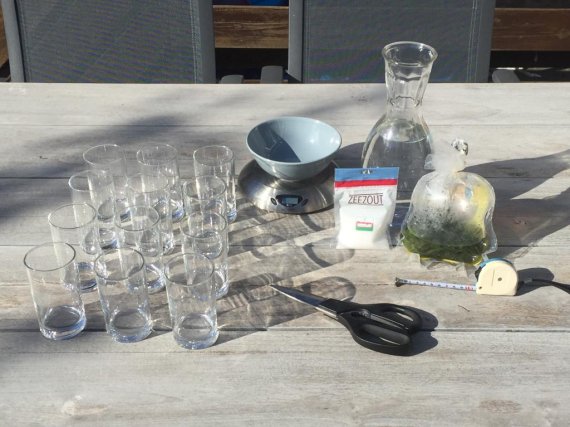Students taking the Introduction Marine and Estuarine Ecology course in period five were scheduled to do fieldwork and experiments on Texel. It wasn’t meant to be: all the period five courses were offered as online education due to the corona crisis.
‘So, the experiments were replaced by online tutorials,’ says Plant Sciences student Daphne Ruiter (21). ‘For the final tutorial, we were required to write a research proposal for an experiment to be conducted on Texel. You were permitted to substantiate the proposal with a pilot study. My group thought that was a great idea, so we wrote a proposal for an experiment that could be carried out at home.’
Invasive algae
During the online classes, the students were introduced to the Caulerpa taxifolia, an invasive species of algae, that causes major problems in the Mediterranean sea. ‘We wanted to know whether this alga might also cause issues in the Wadden Sea if climate change causes its water temperature to rise. So, we studied the influence of temperature on the growth and survival of the Caulerpa taxifolia using the wine cooler my parents keep in their attic.’
This wine cooler has several different temperatures, Ruiter explains. ‘At the top, it is twenty degrees, at the bottom it is six degrees. In between, there are different temperatures. First, we wanted to set several fridges to different temperatures, but the disadvantage is that a fridge does not allow any light to enter. The wine cooler has a glass door, allowing light to enter.’ The algae were available online. ‘Quite useful, for an invasive species.’ The seawater was homemade. ‘It has the same salinity as the water in the Wadden Sea.’
Reproducible
The outcome of the experiment was surprising, Ruiter states. ‘The experiment did not last long enough for us to see any growth, but there was a visible difference in quality between the algae. Surprisingly, the algae kept at lower temperatures did a lot better than those kept at higher temperatures. This suggests that the Caulerpa taxifolia could already survive in the Wadden Sea if the winters are mild. Thus, I really think it would be a good idea to repeat this experiment under more favourable conditions because the alga might form a serious threat to life in the Wadden Sea.’
‘All students were disappointed that the fieldwork was cancelled,’ Ruiter says. ‘But the teachers made it a very challenging and varied course nonetheless.’


 The necessities for the test. Photo: Daphne Ruiter
The necessities for the test. Photo: Daphne Ruiter